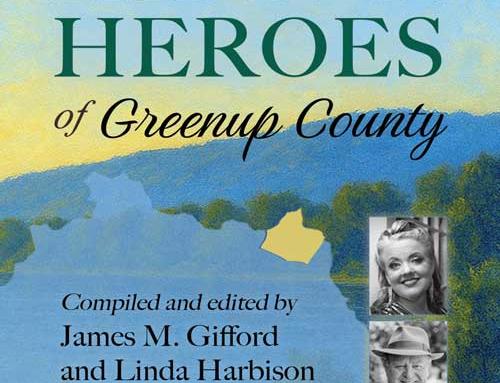In the fall of 1938, Jesse Stuart arrived in Greenup after a year of studying and writing abroad. A large delegation of friends and family met him at the train station, and many inquired about his plans. Jesse told them that he expected to rest up and return to his teaching position at Greenup High School. However, that evening Jesse visited his friends Oscar and Ann Sammons, and they filled him in on the local news, which wasn’t good.
While Jesse had been away, Democratic county clerk Joe Bates had been elected to the U.S. Congress and had become oppressive to Republicans in Greenup County. He and his cohorts controlled the Greenup News and repressed most voices of dissent. Bates represented the majority of county officials, who were also backed by a school board with a newly appointed superintendent, Democrat Tongs West. After West took over the Greenup County Board of Education, he fired many veteran teachers and also refused to honor the formal leave of absence Stuart had been granted before he left for Scotland on his prestigious Guggenheim Fellowship.
 Angry and unemployed, Stuart took a job teaching remedial English at Portsmouth High School and accepted the editorship of the Greenup County Citizen without pay in order to wage war against West and Bates, both of whom he considered outsiders who did not understand the needs of Greenup citizens. Stuart’s enemies at the Greenup News retaliated in their paper, ridiculing him as a “globetrotter” whose “power of imagination is really more noticeable in his Editorials than in his poetry.” Any time Stuart was mentioned in their paper, he was referred to as “the pouting poet of W-Hollow.” Jesse responded by comparing Bates to the dictators he had seen rising in Europe. Italy had Benito Mussolini, Russia had Joseph Stalin, Germany had Adolph Hitler, and Greenup County, wrote Stuart, had “her small dictator, Joe Bates.”
Angry and unemployed, Stuart took a job teaching remedial English at Portsmouth High School and accepted the editorship of the Greenup County Citizen without pay in order to wage war against West and Bates, both of whom he considered outsiders who did not understand the needs of Greenup citizens. Stuart’s enemies at the Greenup News retaliated in their paper, ridiculing him as a “globetrotter” whose “power of imagination is really more noticeable in his Editorials than in his poetry.” Any time Stuart was mentioned in their paper, he was referred to as “the pouting poet of W-Hollow.” Jesse responded by comparing Bates to the dictators he had seen rising in Europe. Italy had Benito Mussolini, Russia had Joseph Stalin, Germany had Adolph Hitler, and Greenup County, wrote Stuart, had “her small dictator, Joe Bates.”
The day after Stuart’s editorial appeared, he and his brother, Jim, were at Leslie’s Drug Store when Jesse was approached by Amos Allen, a constable from Argillite, a small community west of Greenup. “Why did you write up poor old Joe in that paper?” Allen inquired in moderate tones.
“Amos, it’s a free country,” Jesse replied. “I’ve a right to voice my opinion.” He also noted that Joe Bates owned a newspaper in Greenup County and could certainly express his side of the story.
“He ain’t done nothing to you.”
“What about the schools?” Jesse responded, voicing a community-wide concern.
A crowd had gathered around them, anxious to hear Allen’s reply. He said nothing, so Jesse turned to pay Sam Leslie. The constable then delivered three powerful blows to the back of Stuart’s head with a blackjack filled with lead. Blood spurted everywhere. Stuart was stunned, and his eyes were covered with his own blood as he closed with his assailant to defend his life. Fortunately, they were pulled apart by the spectators just as Jesse began to strangle Allen. “I had his tongue chocked [sic] out, in my addled condition,” he wrote later, describing the incident with relish. “If we had been left alone I would have whipped Amos Allen. This is the price I had to pay for writing an editorial about Dictator Joe Bates—the Dictator of Greenup County.”
Jesse was rushed to a hospital in Ironton, Ohio, suffering from “six severe scalp wounds,” which would leave him with three jagged scars for the rest of his life. He claimed to have “poured the blood out of [his] shoes at the hospital.” Meanwhile, Allen was arrested for assault with a deadly weapon with intent to kill. Both men were also charged with breach of the peace, but those charges were later dismissed. The next Friday, October 7, a retaliatory 1400-word editorial appeared in the Greenup County Citizen, in which Jesse pledged “to write 10,000 words” for each drop of blood he had shed and to fight to the death, if necessary.
Stuart’s assault and the resulting trial of Amos Allen became a national cause célèbre. Time Magazine carried a two-page article on the incident, and papers everywhere covered the story and speculated on Jesse’s future in Greenup County. In a December 26, 1938, response to Time, Jesse declared that he would not easily “get over” what Allen had done. Furthermore, he refused to leave Kentucky until he was “good and ready to go.” Jesse was living dangerously, and everyone from casual acquaintances to complete strangers tossed condolences and counsel into the epistolary ring.
Finally in late January 1939, Amos Allen was found guilty of assault and battery. He paid a two-hundred-dollar fine, but received no prison sentence. It was only a small victory for Stuart, but it brought closure to this violent episode.
Eighty-three years have passed and the episode is still shrouded in some mystery. In rural communities at the time, violent political clashes were common, but Amos Allen’s attack on Stuart was extraordinarily ruthless. Could it have been provoked by something more than Jesse’s editorials in the Greenup County Citizen? For more information on this dramatic episode, see pages 79-89 in my biography of Stuart, “Jesse Stuart: An Extraordinary Life,” available at the Jesse Stuart Foundation Bookstore & Gift Shop. Call 606.326.1667 or e-mail jsf@jsfbooks.com.
By James M. Gifford
JSF CEO & Senior Editor
In the fall of 1938, Jesse Stuart arrived in Greenup after a year of studying and writing abroad. A large delegation of friends and family met him at the train station, and many inquired about his plans. Jesse told them that he expected to rest up and return to his teaching position at Greenup High School. However, that evening Jesse visited his friends Oscar and Ann Sammons, and they filled him in on the local news, which wasn’t good.
While Jesse had been away, Democratic county clerk Joe Bates had been elected to the U.S. Congress and had become oppressive to Republicans in Greenup County. He and his cohorts controlled the Greenup News and repressed most voices of dissent. Bates represented the majority of county officials, who were also backed by a school board with a newly appointed superintendent, Democrat Tongs West. After West took over the Greenup County Board of Education, he fired many veteran teachers and also refused to honor the formal leave of absence Stuart had been granted before he left for Scotland on his prestigious Guggenheim Fellowship.
Angry and unemployed, Stuart took a job teaching remedial English at Portsmouth High School and accepted the editorship of the Greenup County Citizen without pay in order to wage war against West and Bates, both of whom he considered outsiders who did not understand the needs of Greenup citizens. Stuart’s enemies at the Greenup News retaliated in their paper, ridiculing him as a “globetrotter” whose “power of imagination is really more noticeable in his Editorials than in his poetry.” Any time Stuart was mentioned in their paper, he was referred to as “the pouting poet of W-Hollow.” Jesse responded by comparing Bates to the dictators he had seen rising in Europe. Italy had Benito Mussolini, Russia had Joseph Stalin, Germany had Adolph Hitler, and Greenup County, wrote Stuart, had “her small dictator, Joe Bates.”

The day after Stuart’s editorial appeared, he and his brother, Jim, were at Leslie’s Drug Store when Jesse was approached by Amos Allen, a constable from Argillite, a small community west of Greenup. “Why did you write up poor old Joe in that paper?” Allen inquired in moderate tones.
“Amos, it’s a free country,” Jesse replied. “I’ve a right to voice my opinion.” He also noted that Joe Bates owned a newspaper in Greenup County and could certainly express his side of the story.
“He ain’t done nothing to you.”
“What about the schools?” Jesse responded, voicing a community-wide concern.
A crowd had gathered around them, anxious to hear Allen’s reply. He said nothing, so Jesse turned to pay Sam Leslie. The constable then delivered three powerful blows to the back of Stuart’s head with a blackjack filled with lead. Blood spurted everywhere. Stuart was stunned, and his eyes were covered with his own blood as he closed with his assailant to defend his life. Fortunately, they were pulled apart by the spectators just as Jesse began to strangle Allen. “I had his tongue chocked [sic] out, in my addled condition,” he wrote later, describing the incident with relish. “If we had been left alone I would have whipped Amos Allen. This is the price I had to pay for writing an editorial about Dictator Joe Bates—the Dictator of Greenup County.”
Jesse was rushed to a hospital in Ironton, Ohio, suffering from “six severe scalp wounds,” which would leave him with three jagged scars for the rest of his life. He claimed to have “poured the blood out of [his] shoes at the hospital.” Meanwhile, Allen was arrested for assault with a deadly weapon with intent to kill. Both men were also charged with breach of the peace, but those charges were later dismissed. The next Friday, October 7, a retaliatory 1400-word editorial appeared in the Greenup County Citizen, in which Jesse pledged “to write 10,000 words” for each drop of blood he had shed and to fight to the death, if necessary.
Stuart’s assault and the resulting trial of Amos Allen became a national cause célèbre. Time Magazine carried a two-page article on the incident, and papers everywhere covered the story and speculated on Jesse’s future in Greenup County. In a December 26, 1938, response to Time, Jesse declared that he would not easily “get over” what Allen had done. Furthermore, he refused to leave Kentucky until he was “good and ready to go.” Jesse was living dangerously, and everyone from casual acquaintances to complete strangers tossed condolences and counsel into the epistolary ring.
Finally in late January 1939, Amos Allen was found guilty of assault and battery. He paid a two-hundred-dollar fine, but received no prison sentence. It was only a small victory for Stuart, but it brought closure to this violent episode.
Eighty-three years have passed and the episode is still shrouded in some mystery. In rural communities at the time, violent political clashes were common, but Amos Allen’s attack on Stuart was extraordinarily ruthless. Could it have been provoked by something more than Jesse’s editorials in the Greenup County Citizen? For more information on this dramatic episode, see pages 79-89 in my biography of Stuart, “Jesse Stuart: An Extraordinary Life,” available at the Jesse Stuart Foundation Bookstore & Gift Shop. Call 606.326.1667 or e-mail jsf@jsfbooks.com.
By James M. Gifford
JSF CEO & Senior Editor




